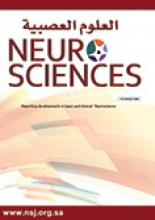Abstract
OBJECTIVE: This study seeks to model proposed causal relationships between the quality of psychiatric referral letters, and its indicators, linked to the features of the referred patient, referring physician, and practice setting.
METHODS: This study was executed at Buraidah Mental Health Hospital, Saudi Arabia, in the year 2000-2002. Data regarding 18 independent variables underlying 3 latent constructs and one dependent variable represented by quality of psychiatric referral letter score (outcome) was derived from patient files, physician training records, and 540 psychiatric referrals. Structural equation modeling was used to analyze the data for examining proposed causal relationships between the quality of psychiatric referral letters, and its potential predictors.
RESULTS: The structural equation modeling analysis revealed a reasonably good fit of the proposed model to the data based on various fit indices. The tested model explained 67% of the variance in the quality of psychiatric referral letters. The referring physician characteristics (experience, education, and psychiatric training) and features of the referral setting (nature of setting and referral letters-administrative information) were highly significant indicators of quality of psychiatric referral letters, which in turn was negatively predicted by patient features including severity of the mental illness.
CONCLUSION: Despite some caveats, the quality of psychiatric referral letters is accurately predicted by 3 latent constructs represented by referring physician skills, nature of the setting, and patient socio-clinical features.
- Copyright: © Neurosciences
Neurosciences is an Open Access journal and articles published are distributed under the terms of the Creative Commons Attribution-NonCommercial License (CC BY-NC). Readers may copy, distribute, and display the work for non-commercial purposes with the proper citation of the original work.






